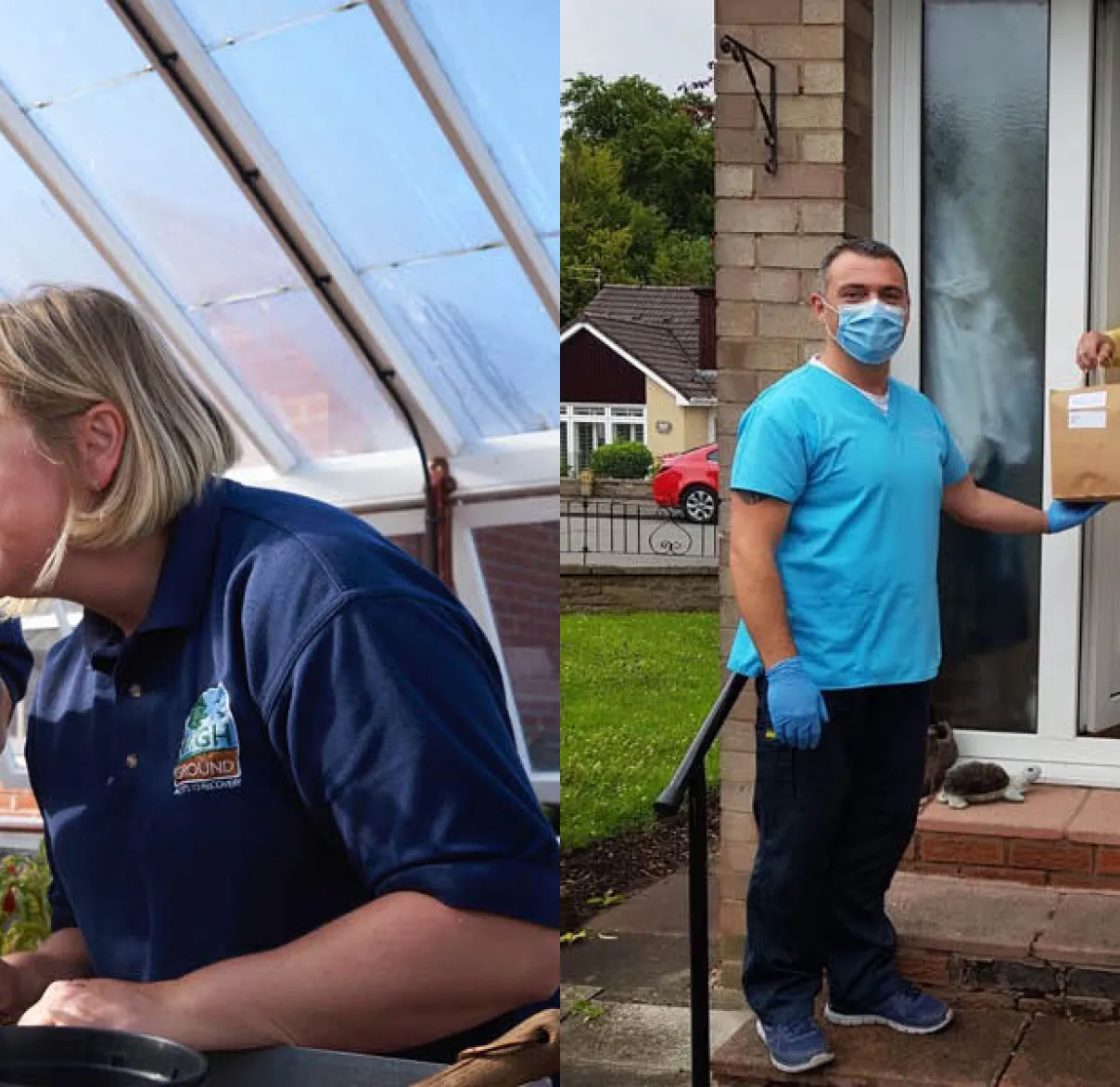Surviving the cost of living crisis: a tale of two charities
John Brady, head of fundraising at St Andrew’s Hospice and Anna Baker Cresswell, executive director of HighGround, share their thoughts on how the cost of living crisis is affecting their charities, and their response to it.

Article last updated 22 July 2025.
As charities strive to recover from the receding pandemic, they now find themselves dealing with the effects of the cost of living (CoL) crisis on their beneficiaries, funding and operations.
According to the Charities Aid Foundation 59% of charitable organisations fear people won’t continue or start to donate because of CoL concerns, and 86% are worried about the impact it is having on those they are helping.
"According to the Charities Aid Foundation 59% of charitable organisations fear people won’t continue or start to donate because of CoL concerns, and 86% are worried about the impact it is having on those they are helping."
Like many other charities, these challenges are certainly being keenly felt by St Andrews Hospice in Lanarkshire, which supports between 3,000 to 4,000 terminally ill people every year at its in-patient unit or while still living in their own homes.
The organisation employs around 200 medical and administrative staff supported by around 570 volunteers to maintain its 30 critical care beds, in-patient and home support services, enabling it to give people a dignified death with compassionate care.
With a turnover of around £10 million, the St Andrew’s 39-strong fundraising team generates £5 million a year from its chain of shops, major fundraising events, regular and ad hoc donations and its own weekly lottery operation.
Demand for services remains consistent – the need for palliative care isn’t dictated by economic conditions – but the charity is being hit by a double-whammy of rising costs amid growing threats to its income.
Firstly, it faces inflation-fuelled salary increases to retain its workforce and secondly, it’s being hit by steeply rising energy and maintenance bills for the hospice building, sorting centre, vehicle fleet and 11 stores. Rocketing food prices also add to the patient care bill.
These challenges are heightened by the struggle to maintain volunteer numbers post-Covid as many people from vulnerable groups remain nervous about returning to charity work.
John Brady, head of fundraising, says: “We’re keeping a careful eye on costs. For example, we’ve negotiated long-term energy deals that lock in discounted rates for as long as possible to mitigate price-rises, but even so, our bills are up and eating into our income.
Income challenges
Clearly, maintaining income is more vital than ever and the organisation is experiencing mixed results.
John explains: “After the initial ‘post-pandemic’ bounce back earlier this year, income from shops has been recovering. However, we’ve noticed that since March fewer people are playing our lottery and regular donors have been cancelling their subscriptions.
“We also believe that fundraising by individuals is probably being hampered by people’s reluctance to ask friends and relatives for money in today’s tough financial conditions.”
He adds: “We’ve had varied success with events. Fewer people took part in our annual Midnight Walk than in previous years, but we doubled the profit we made on our Summer Ball compared to the previous one, pre-pandemic.”
John attributes this latter success to several factors. These include deliberately aiming to attract more high net worth individuals to the event, spending more ‘personal’ time with donors; and enabling beneficiaries’ families to share their experiences of how donations helped them and their loved ones in an authentic way donors can relate to.
Sharing lessons learned
“The Summer Ball showed us that going forward our messaging needs to be more about our donors and beneficiaries experiences’ and less about us, and show how individual giving makes a real difference.
“We hadn’t focused on high net worth individuals before and it paid off. So, in uncertain economic times it pays charities to review and diversify their revenue streams, to be agile and think about new ways of bringing in money.
“But no matter how tough it gets, I wouldn’t advise cutting any one type of fundraising unless it’s genuinely not working. During Covid we had to stop face-to-face canvassing but restarted as soon as we could, and most of the givers we recruited then are still with us.”
A different way
HighGround, a small military charity that focuses on horticultural and conservation therapy and training for injured servicemen and women, is also concerned about the impact of CoL on its income.
The charity pays for a horticultural therapist and therapeutic gardens manager to help 25 patients every week with their recovery programmes at Stanford Hall, the UK’s Defence and National Rehabilitation Centre in Leicestershire. It also funds Rural Week training courses at agricultural colleges for people leaving the armed forces to learn about potential post-military career opportunities in agriculture, horticulture and conservation, or to take part in Rural Week Experiences focusing on wellbeing.
HighGround will cost almost £400,000 to run in 2022/23, yet receives no statutory funding. More than 90% of its income is derived from grant-making trusts, charities and bodies such as the Army and RAF Benevolent Funds, Greenwich Hospital and the Royal Marines Charity. Other income comes from commercial partners and funders, and the Friends of HighGround fundraising group.
Executive Director Anna Baker Cresswell, who founded HighGround nearly a decade ago, acknowledges many of the grant-making institutions also face economic challenges. She and her small team of three staff and three volunteers spend much of their efforts pursuing and managing grant applications and maintaining the relevant relationships.
“During Covid fundraising became more difficult in general,” says Anna, “but once the worst was over we thought people would begin to start holding events and other activities to support us again. Sadly, thanks to the cost of living crisis, that’s just not happening and I’ve yet to meet any individual or organisation that isn’t being impacted in some way.
“Rising costs are pushing up our operating overheads yes, but the real concern is how falling income might inhibit our rehab therapy and the Rural Weeks programme, which costs nearly £2,000 a head to run.”
Anna and the team have only limited time to pursue income options beyond grants, – through partnerships, sponsorships, events, subscription donations and launching campaigns for example. “We would like to spend more time doing more traditional, face-to-face fundraising among the public too, but our resources are very limited.”
Despite this, HighGround is enjoying some success with its new digital campaign to raise awareness of and increase donors. Its T-shirt ‘wear and share’ challenge involves asking supporters to submit a photo of themselves taking part in outdoor activities wearing a HighGround-branded T-shirt for the team to distribute across social media. So far, it’s estimated to have reached 5,000 people and encouraged 17 people to become ‘Friends of HighGround’.
The charity has also recently secured a significant partnership with Leicester-based homebuilding giant Barratt Homes. Anna is keen to attract more corporate funding and partnerships and is actively looking for a high-profile business or land-based organisation to select HighGround as its chosen charity.
“One of the key messages we’re emphasising to potential partners and funding businesses is that supporting us can help them meet some of their ESG objectives.”
She concludes: “Ultimately, attracting new financial supporters and retaining existing ones in hard times means being really good at communicating your success stories. We know that to win donors’ hearts and minds we have make it very clear how we spend their money and how it changes people’s lives and we will be focusing our limited resources on that.”



